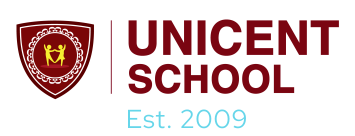Our Academics
Unicent recognizes the great diversity in backgrounds, needs, and aspirations of its children and enriches the curriculum that meets these needs while operating within the guidelines established by the CBSE.
UNICENT recognizes the diversity in backgrounds, needs, and aspirations
of its children and creates a provision in the curriculum for each child to
learn at his/her own pace using several methods. The learning is student-
centred where the child is prepared for experiential and multi-dimensional
learning where the focus is to explore and experiment; discover and
deliberate knowledge in multiple ways.
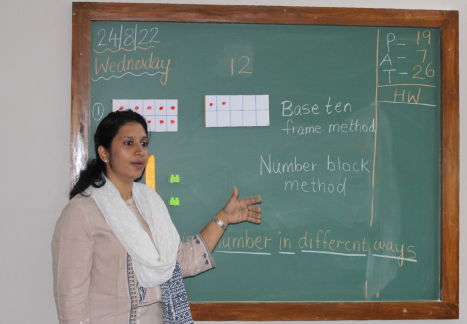
The Cambridge Curriculum from grades 1 to 5 emphasizes on mastering subjects in depth, using innovative pedagogies that prepare a child to master the 21st century skills and be work ready in the future.
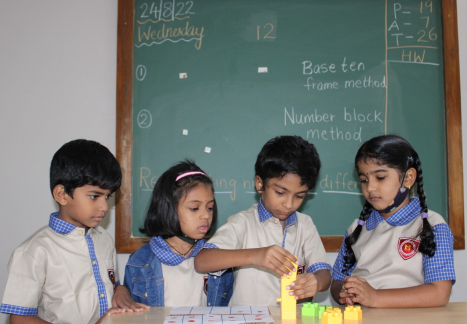
Once a student reaches grades 6, he/she is equipped with all the tools to engage in depth with the content based on the CBSE curriculum and excel in academics.
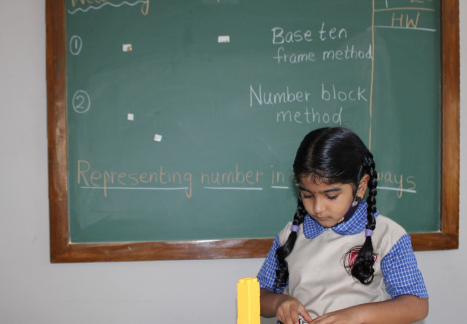
Cross curricular activities integrate three subjects where a particular topic is understood from three different perspectives to give the children a holistic and well rounded understanding of the said topic.
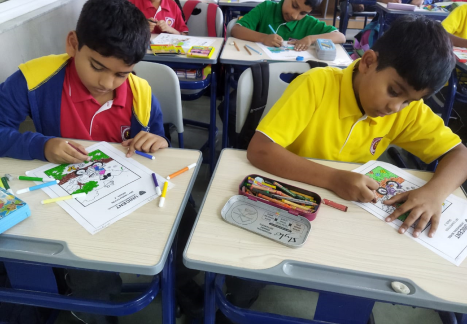
The school follows Cambridge curriculum for grades 1 to 5 that prepares students for life, helps them develop curiosity and a lasting passion for learning. It sets clear learning objectives and focuses on developing knowledge and skills, providing strong foundations for the next stage of education and helps them explore their abilities to their highest potential.
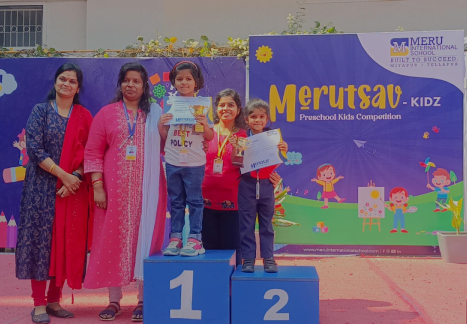
Highly interactive Student- centred pedagogical practices like Activity based learning, Project based learning, Experiential learning, and Inquiry based learning are incorporated into the curriculum for in depth knowledge which can be extrapolated to use in their daily lives.
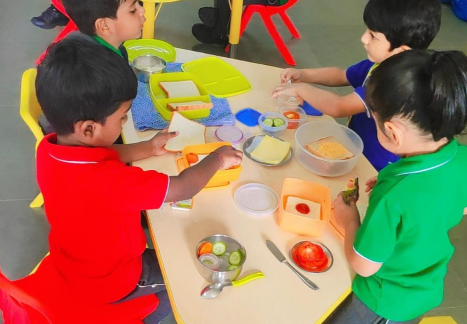
The Subject enrichment activities add another layer of depth to the knowledge imparted in the classroom as the students self-learn while performing a hands-on activity to engage deeply with content and learn actively, constructively, and socially which gears them towards a continued self-learning journey.
Key Aspects of our curriculum in core subject areas:
Math: The Mathematics curriculum framework is designed based on dimensions of Mathematics literacy, Mathematics proficiency and Mathematics competency which focuses on the principles, patterns, systems, functions and relationships so that learners can apply their mathematical knowledge in their daily lives.
English: The English curriculum enables learners to communicate confidently and effectively and to develop the critical skills to respond to a range of information, media and texts with in depth understanding. The framework covers knowledge, skills and understanding in the four language modes – reading, writing and speaking and listening. This curriculum develops learners’ LSRW skills in conjunction with Cambridge Assessment English and is based on the Council of Europe’s Common European Framework of Reference for Languages (CEFR), used across the world to map learners’ progress in English.
Science: The Science curriculum framework is driven by scientific enquiry, which is about considering ideas, evaluating evidence, planning, and investigating, critical thinking, recording and analysing data. Environmental awareness and history of science are also part of the curriculum. Each concept is taught using Yardstick kits for students to learn by performing the activities.
CBSE Curriculum for grades 6 and above
Middle and High school curriculum at UNICENT is built on the basis of “Principles of Constructivism” which is a holistic approach to teaching and learning. The curriculum creates a platform for children to develop Social, Emotional, Cognitive and self –learning skills by giving them concrete hands-on learning activities. The role of the teacher here transforms from a teacher to a facilitator. CBSE curriculum exposes the students to various co-curricular and extra- curricular activities besides comprehensive academic classes. Children are exposed to various activities during the teaching learning process by involving them in – Debates, Discussions, Conversations Projects, Group activities, Field visits, Brainstorming sessions Role plays, Collage making, Power point presentations, Quizzes etc.

Professional Development for Teachers
Building and sustaining quality education in a school is the need of the hour. Rapidly changing social and technological environment around the child calls for research based approaches to address the rising challenges on a day-to-day basis. These challenges cut across the curriculum, methodologies, teacher’s talent, home-school relations and beyond. Unicent strategically addresses these challenges through its multi-pronged initiatives that add tremendous value to the overall school environment.
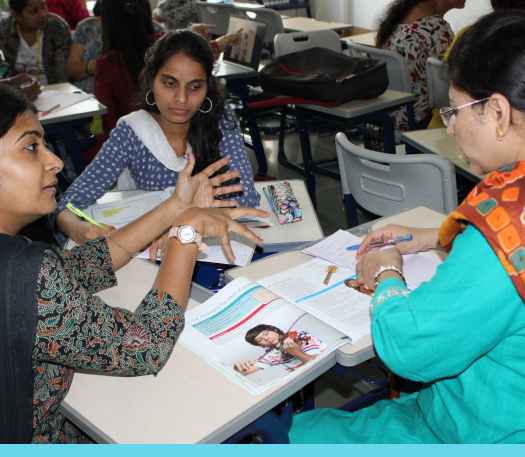
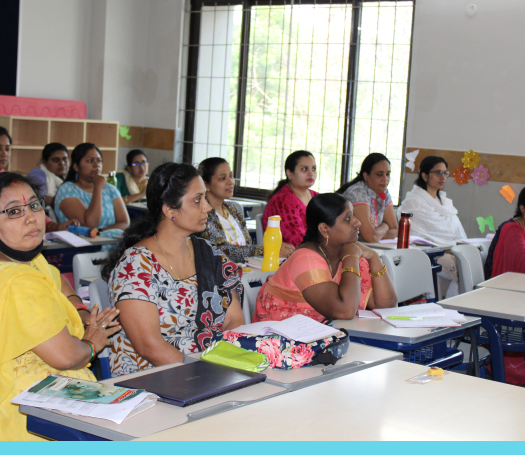
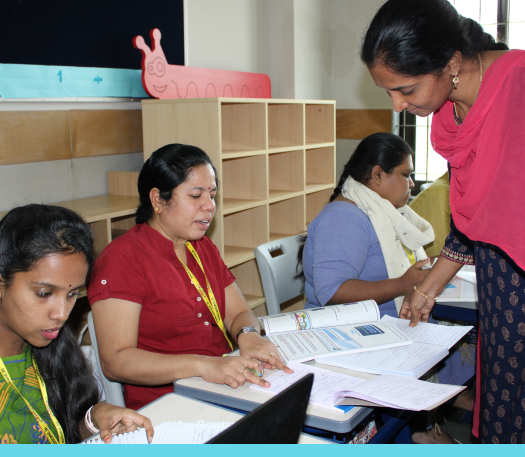

Training Programmes of the School
Training programmes are categorized into 2 kinds –
- Ongoing through regular mentoring and coaching
- Specialized programmes
Ongoing Trainings
Unicent believes that a school curriculum must be dynamic. The teachers not only design and develop pedagogy that enriches the school curriculum but also periodically review the content and the practices, thus enriching the curriculum from time to time. Workshops are organized to empower the teachers to review the content and their own practices and modify them from time to time.
An in-house group of teachers contribute extensively to teacher training and development through intervention and institutional modes. This enhances the competencies of teachers and helps them deal efficiently with the dynamic curriculum. It allows them to apply the innovations and learnings to the educational concepts in class room teaching – learning processes. These academic leaders not only train but also hand hold the teachers to ensure their effective functioning throughout the academic year.
Some of the in-house trainings are conducted for a couple of months before the academic year commences. The focus is on mastering the pedagogies to impart knowledge to students with special attention to slow learners. During these trainings, teachers master methods such as JIGSAW Cooperative learning method, Inquiry Based learning and Active Learning and Activity Based Learning.
Specialized Programs
Our teachers are encouraged to attend workshops, seminars and conferences to not only learn from experts and also interact with professionals from their fields to exchange and sharpen their methodologies in their teaching tool kits. This makes their classrooms lively, interactive and engaging for the students.
The school policy is to protect all members of the UIS community – students, staff, parents and visitors, for the treatment of any minor (bumps/cuts/bruises) medical issues which may occur on the school grounds. First aid can save lives and prevent minor injuries that may turn into life threatening ones.
Teachers and other staff in charge of students are trained to always use their best judgement, particularly during emergencies, to ensure the welfare of the students at school.
Types of Training Programmes
- Early Childhood Development and Education
- Curriculum Development
- Pedagogical practices
- Effective Classroom Management
- Communication Skills and soft skills
- Teacher effectiveness
- Home-School Continuum
- Leadership training
- Personal Effectiveness
- First aid training
Timely Student Assessments
Continuous and Comprehensive Evaluation refers to system of school based assessment that covers all aspects student’s development. The comprehensive component CCE takes care of assessment of all round development of the child’s personality. It includes assessment in scholastic and co-scholastic aspect in student’s growth. Students will be evaluated both in scholastic and non- scholastic areas as per the guidelines & norms issued by government.
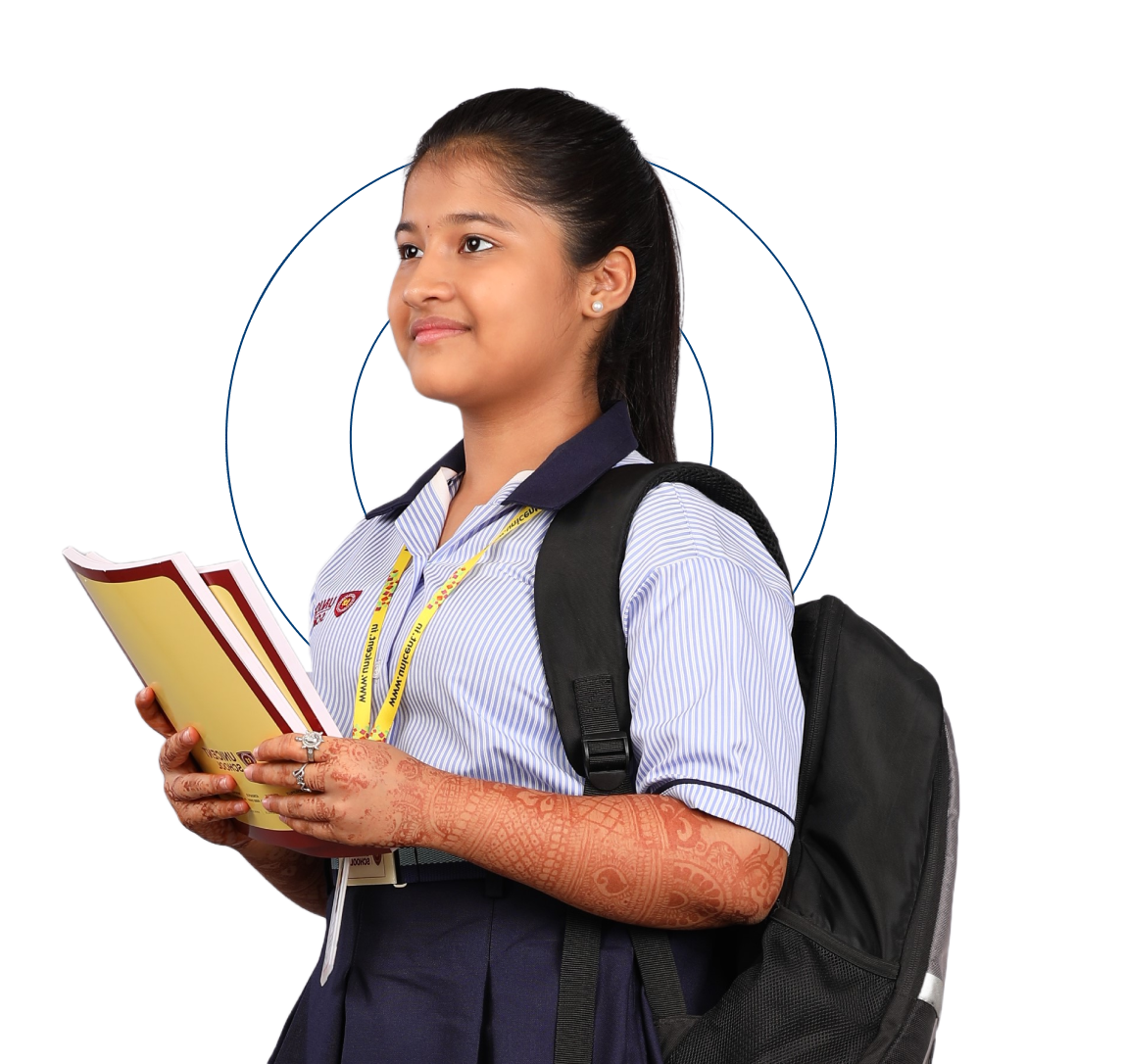
Timely Student Assessments
Continuous and Comprehensive Evaluation refers to system of school based assessment that covers all aspects student’s development. The comprehensive component CCE takes care of assessment of all round development of the child’s personality. It includes assessment in scholastic and co-scholastic aspect in student’s growth. Students will be evaluated both in scholastic and non- scholastic areas as per the guidelines & norms issued by government.

Want your kids to DREAM BIG?

